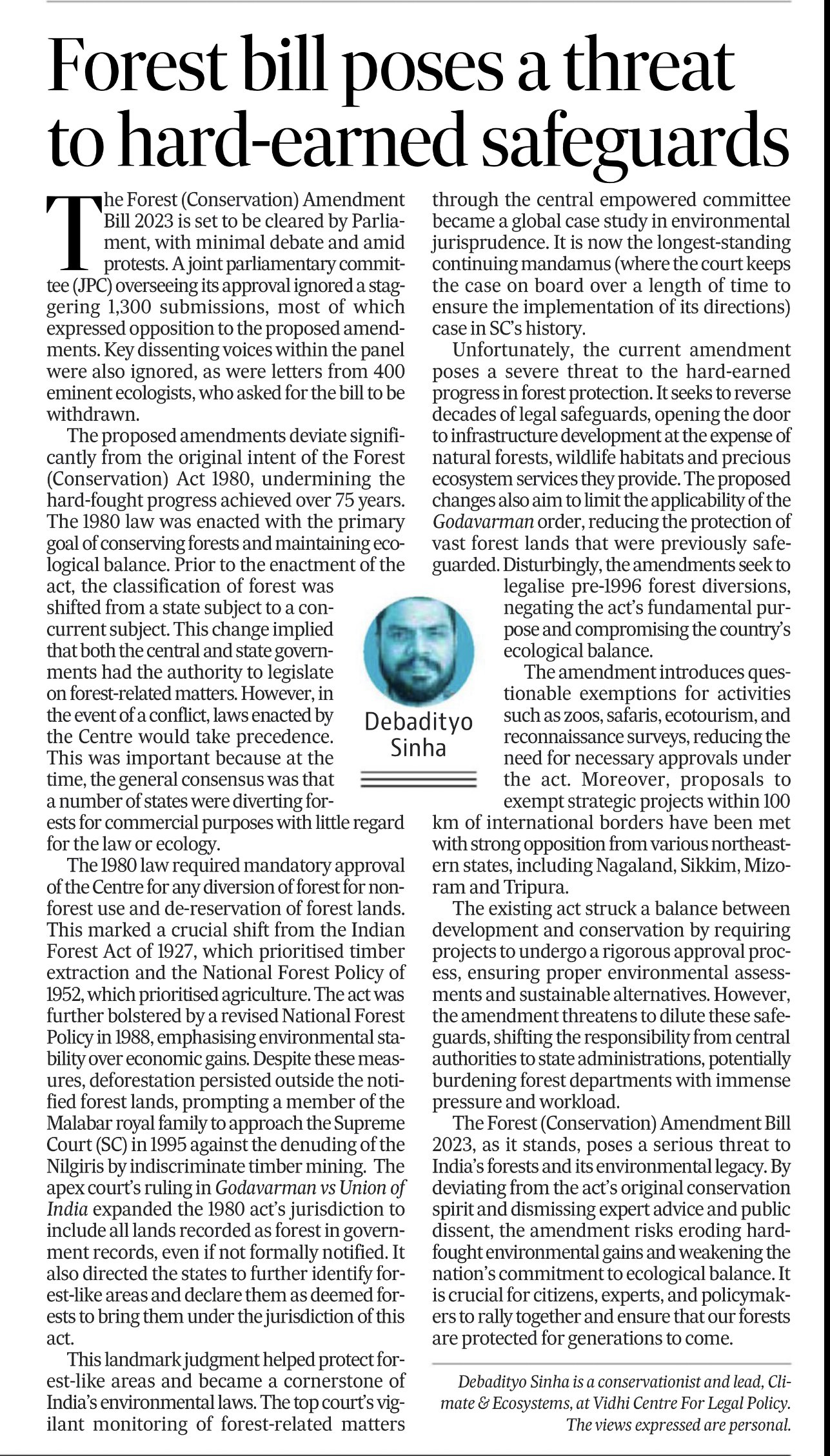The Forest (Conservation) Amendment Bill 2023 threatens India’s forests and environmental legacy, ignoring expert advice and public opposition.
The Forest (Conservation) Amendment Bill 2023 is set to be cleared by Parliament, with minimal debate and amid protests. A joint parliamentary committee (JPC) overseeing its approval ignored a staggering 1,300 submissions, most of which expressed opposition to the proposed amendments. Key dissenting voices within the panel were also ignored, as were letters from 400 eminent ecologists, who asked for the bill to be withdrawn.
The Forest Conservation (Amendment) Bill was cleared in the Lok Sabha despite concerns.PREMIUM
The Forest Conservation (Amendment) Bill was cleared in the Lok Sabha despite concerns.
The proposed amendments deviate significantly from the original intent of the Forest (Conservation) Act 1980, undermining the hard-fought progress achieved over 75 years. The 1980 law was enacted with the primary goal of conserving forests and maintaining ecological balance. Prior to the enactment of the act, the classification of forest was shifted from a state subject to a concurrent subject. This change implied that both the central and state governments had the authority to legislate on forest-related matters. However, in the event of a conflict, laws enacted by the Centre would take precedence. This was important because, at the time, the general consensus was that a number of states were diverting forests for commercial purposes with little regard for the law or ecology.
The 1980 law required mandatory approval of the Centre for any diversion of forest for non-forest use and de-reservation of forest lands. This marked a crucial shift from the Indian Forest Act of 1927, which prioritised timber extraction and the National Forest Policy of 1952, which prioritised agriculture. The act was further bolstered by a revised National Forest Policy in 1988, emphasising environmental stability over economic gains. Despite these measures, deforestation persisted outside the notified forest lands, prompting a member of the Malabar royal family to approach the Supreme Court (SC) in 1995 against the denuding of the Nilgiris by indiscriminate timber mining. The apex court’s ruling in Godavarman vs Union of India expanded the 1980 act’s jurisdiction to include all lands recorded as forest in government records, even if not formally notified. It also directed the states to further identify forest-like areas and declare them as deemed forests to bring them under the jurisdiction of this act.
This landmark judgment helped protect forest-like areas and became a cornerstone of India’s environmental laws. The top court’s vigilant monitoring of forest-related matters through the central empowered committee became a global case study in environmental jurisprudence. It is now the longest-standing continuing mandamus (where the court keeps the case on board over a length of time to ensure the implementation of its directions) case in SC’s history.
Unfortunately, the current amendment poses a severe threat to the hard-earned progress in forest protection. It seeks to reverse decades of legal safeguards, opening the door to infrastructure development at the expense of natural forests, wildlife habitats and precious ecosystem services they provide. The proposed changes also aim to limit the applicability of the Godavarman order, reducing the protection of vast forest lands that were previously safeguarded. Disturbingly, the amendments seek to legalise pre-1996 forest diversions, negating the act’s fundamental purpose and compromising the country’s ecological balance.
The amendment introduces questionable exemptions for activities such as zoos, safaris, ecotourism, and reconnaissance surveys, reducing the need for necessary approvals under the act. Moreover, proposals to exempt strategic projects within 100 km of international borders have been met with strong opposition from various northeastern states, including Nagaland, Sikkim, Mizoram and Tripura.
The existing act struck a balance between development and conservation by requiring projects to undergo a rigorous approval process, ensuring proper environmental assessments and sustainable alternatives. However, the amendment threatens to dilute these safeguards, shifting the responsibility from central authorities to state administrations, potentially burdening forest departments with immense pressure and workload.
The Forest (Conservation) Amendment Bill 2023, as it stands, poses a serious threat to India’s forests and its environmental legacy. By deviating from the act’s original conservation spirit and dismissing expert advice and public dissent, the amendment risks eroding hard-fought environmental gains and weakening the nation’s commitment to ecological balance. It is crucial for citizens, experts, and policymakers to rally together and ensure that our forests are protected for generations to come.
Debadityo Sinha is a conservationist and lead, Climate & Ecosystems, at Vidhi Centre for Legal Policy. The views expressed are personal.
The article appeared in Hindustan Times, print edition on 2nd August 2023 and can be also accessed online here.



